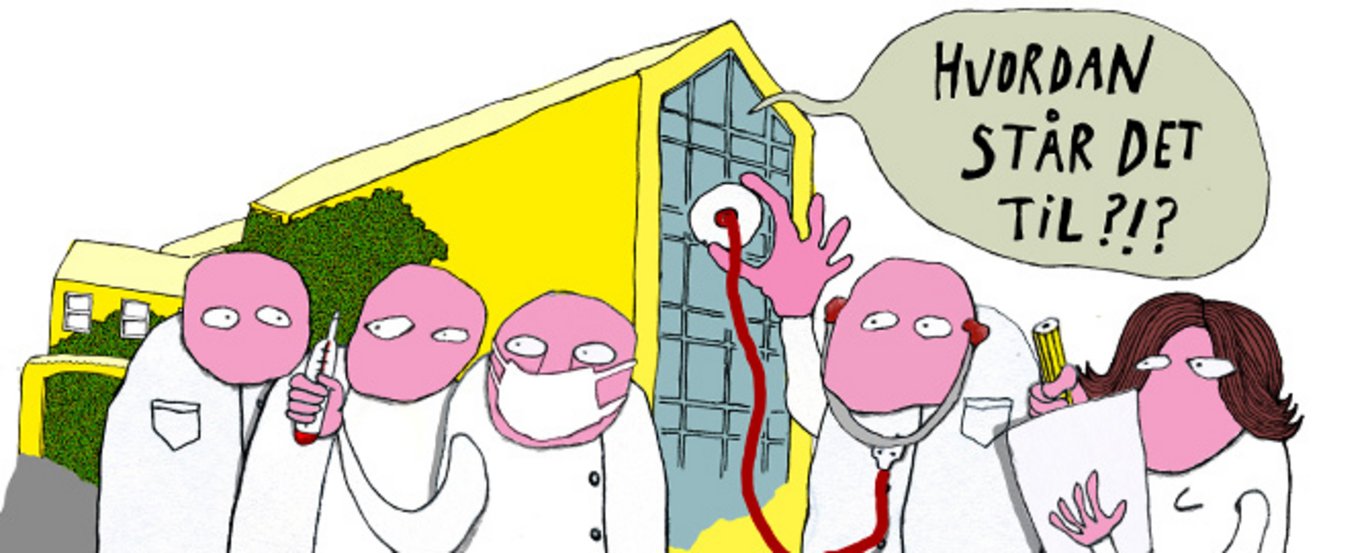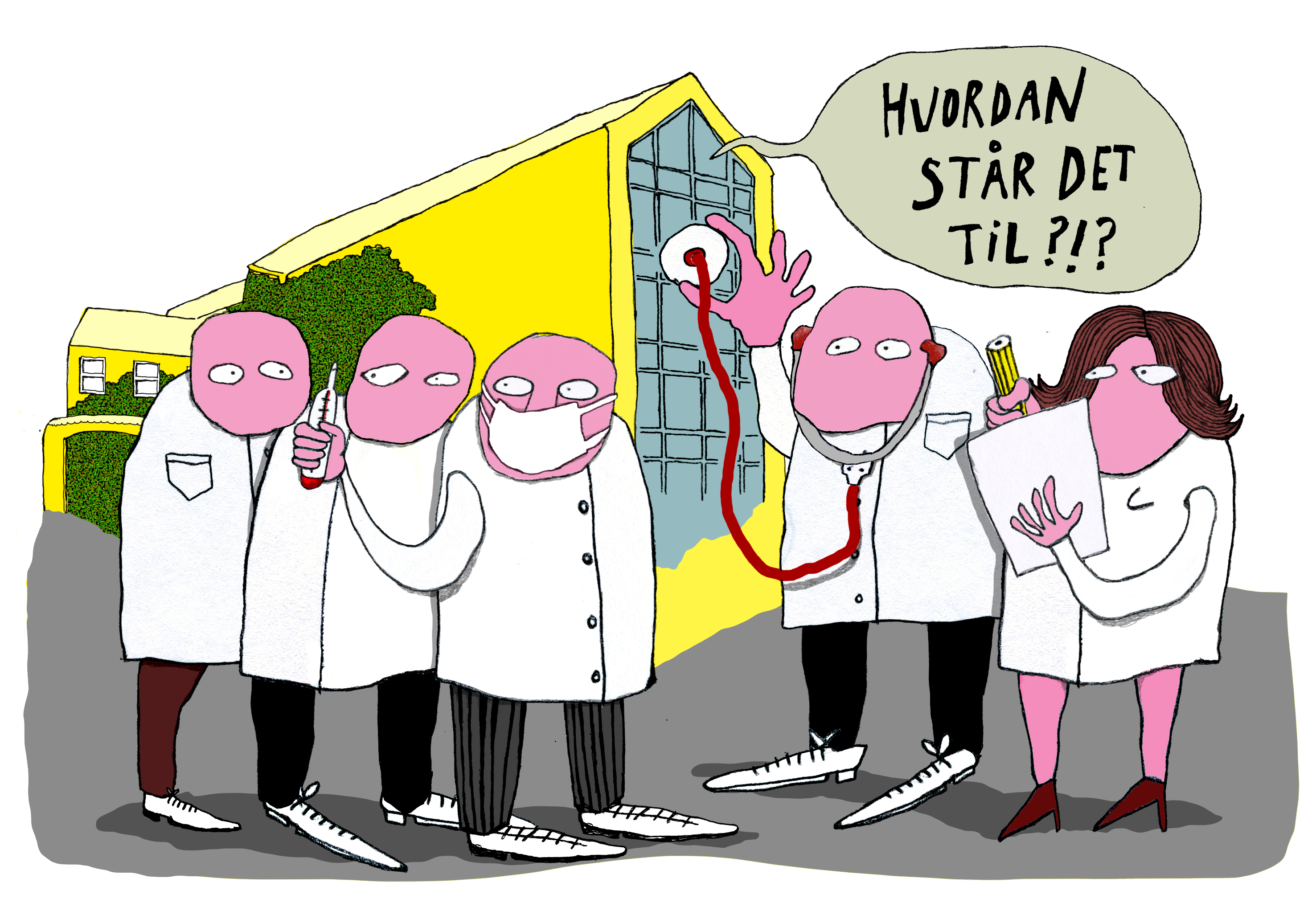Expert group focusing on the departments
The expert group tasked with analysing where things went wrong with the reorganisation of the university has the departments as the focal point of its analysis.


“The departments are at the centre of our analysis. They are centrally positioned in all of the changes that we’ve been through and they’re central in relation to the basic production; the research and the teaching. So it’s natural that we have a lot of focus on them,” says professor Torben M. Andersen from the Department of Economics and Business, who is chairman of the expert group.
All department heads to be interviewed
As one of its first acts the expert group has gathered the four department heads, partly to “get a general view of the situation,” as Andersen puts it, but also to prepare the questions that will be asked during the interviews with all of the department heads at AU.
“The four department heads represent different types of departments and different types of programmes. There’s a very big difference in how they’ve been affected by the changes that have taken place in connection with the restructuring. So that difference is an important angle for us,” says Andersen.
He goes on to explain that the expert group is especially interested in hearing the views of the four department heads on how the interaction between them and the administrative divisions functions and how they deal with the internal organisation after a number of departments have become much larger units.
The expert group does not have the task of analysing the whole of the academic development process as “organisational and administrative conditions are the sole object of the analysis. An independent international evaluation of the academic development process as a whole is scheduled for 2016,” as it is formulated in the mandate.
Look at the means, not the goals
“You could say, in rather simplistic terms, that the management decided on some goals for the academic development process and then chose some means to achieve them. We’ll look at the means but we have not been asked to address the goals.”
What do you think of not being asked to analyse the goals when, at the same time, the expert group’s task is to ensure “that the academic development process is anchored in the organisation”?
“It’s a clear goal of the academic development process that e.g. interdisciplinarity must be strengthened. We can of course present some indicators on this aspect but you cannot really take a stance because there hasn’t been enough time. But that doesn’t mean that we can’t look at this type of thing in our analysis. The management has in fact presented some clear grounds for the organisation of the administrative and the organisational areas. For example, in relation to the development process,” says Andersen.
Is that appropriate?
The professor elaborates on the management’s grounds in relation to the administrative aspect:
“They have e.g. said that the department head should only concentrate on the academic management. Is that what’s happened? And is it realistic within the framework that has been given? You could also ask: How expedient is it to have the academic management detached from the administrative management? The answers to these questions obviously have an influence on the research that the researchers are able to deliver.
Fostering Interdisciplinary?
Torben M. Andersen goes on to explain about the management’s grounds for the size of the departments after the reorganisation:
“You can ask whether it’s more than a nice thought that larger departments foster interdisciplinarity. You could maybe imagine that it creates such a level of alienation that you end up looking towards the very narrow group in the large unit. That’s one of the aspects that we already have spotted after the interview with the four department heads and which we will probably incorporate in the questionnaire to be sent to the researchers.”
He continues:
“I certainly think that we will receive very different responses as we already know that the changes have had greatly varying consequences in the different areas. Looking at the workplace assessment, you could see that there was a very close correlation between how the researchers had been affected by the development process, and whether they considered it to be positive or negative.
Andersen ends:
“Looking at all of this is not the same as considering the overall strategic goal in the academic development process as such. It’s taking into consideration whether the administration and the organisation that you have implemented actually does support the goals. If that’s not the case then of course it’s a problem.”
Rector looking at a couple of handfuls of issues
Rector Brian Bech Nielsen will not point to the particular problems he finds to be greatest when it comes to getting the orchestra to play better at AU. But during the visits he made around the university to listen to people’s opinions shortly before taking up the post of rector, he picked up on “a couple of handfuls of issues,” all of which he can see being addressed in the mandate.
The expert group will present a report to the analysis panel which consists of representatives for the staff and students at AU. The analysis panel then has the task of commenting on the expert group’s report before the panel sends it to the senior management team.
“I expect us to have a very good basis for decision,” says rector Nielsen.
The expert group will not present concrete proposals for solving the problems. How should that be understood?
“As management we have an obligation to come with a proposal and we of course intend to send that proposal for consultation at the university.”
But can the expert group point towards solutions for the problems. Propose that you could follow either plan A or plan B?
“Yes and I’m also certain that they will do this. Otherwise it will be the first time an expert group hasn’t taken the opportunity to present proposals,” laughs Nielsen. He continues in a more serious tone:
“The expert group must not - to put it bluntly - end up with a new 9 March report because we cannot, as an organisation, deal with that right now. We need first of all to see how we get our machine fixed. And it’s first once it’s fixed that it makes sense to carry out an international evaluation of the goals for the academic development process. The process is therefore a two-step process.”
How drastically will you set about changes within the framework that you have defined for the expert group’s internal analysis?
”We have problems that are hurting us and must be solved and the necessary remedies will be used. At the present time I will not promise anything at all, but I will look very carefully at the results that come from the expert group.
When will the senior management team have its decisions ready?
We’ll aim to make an announcement after the summer holiday. It’s possible that some of the decisions will need to be confirmed by the board, so things have to fit into their calender.
“I must firstly discuss when and how the expert group’s report should be published with the analysis group,” says Nielsen to the question of whether the staff and students will be given the opportunity to read the expert group’s report with the analysis group’s comments. He continues:
“But I would find it natural for the report to be included as an appendix in connection with the consultation process.
All staff members and students will receive a questionnaire shortly after Easter.
The expert group will ask both students and staff about specific conditions relating to organisational and administrative aspects. Everyone will asked but not everyone will receive the same questionnaire. At present the group is finding out which questions are relevant for the different target groups based on interviews with selected representatives from the target groups.
How do things look from your viewpoint?
”We place a high priority on openness so everyone is welcome to write to us,” says professor Torben M. Andersen. Several people have already sent an email to the expert group.
“We find it extremely helpful to receive emails because they give us an impression of which problems are generic. People are welcome to write about very specific aspects as this can tell us something about the structural issues. For example: How does the system responds to problems? What problems are the staff are left with, where they simply have no idea how to solve them?”
“When we deliver our report it will in no way be possible to see who has written to us, so no one should be afraid of being recognised as the sender of a message in the final report,” says Andersen.
The expert group’s email: ekspertgruppen@au.dk
The expert group will concentrate on three issues
The expert group has a brief to look into three issues: Accessible management, employee and student involvement in decisions, and administrative support of the university.
See the expert group’s mandate
The analysis panel and the expert group were presented in Omnibus number 5: Analysis panel hard at work
Translated by Peter Lambourne

